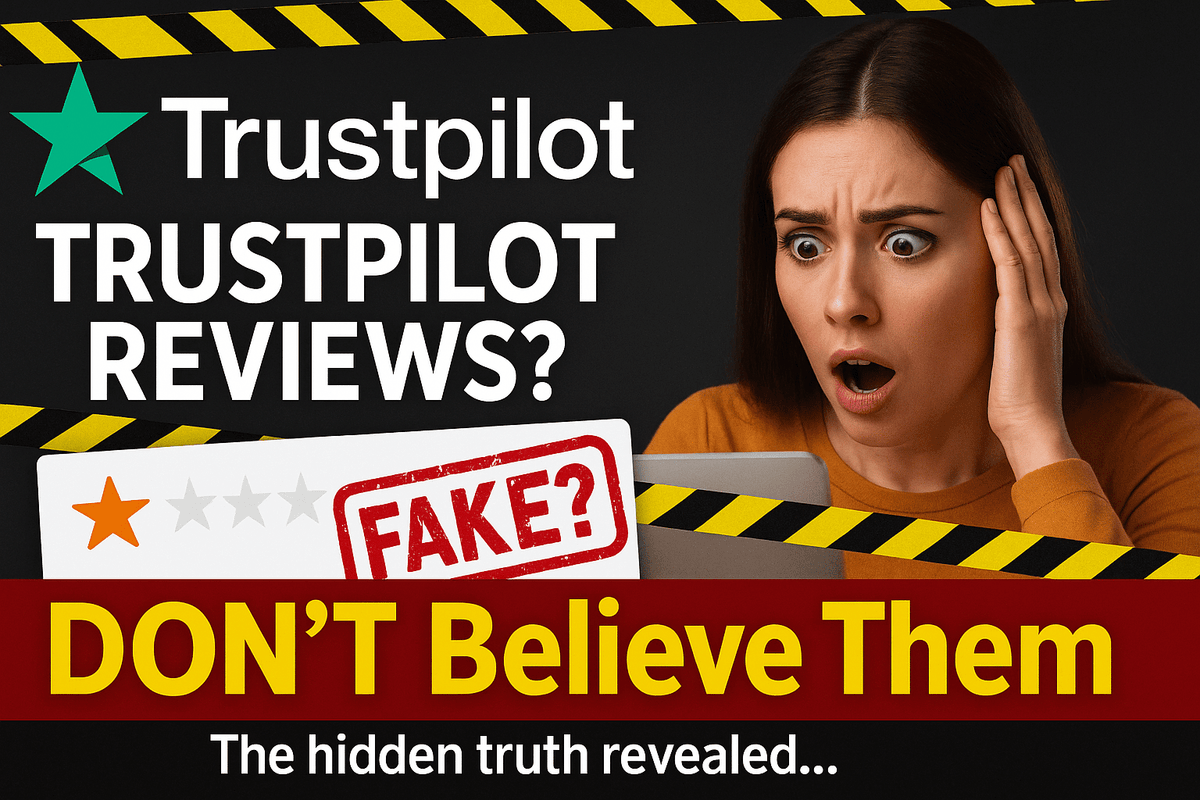Why Trustpilot Cannot Be Trusted: A Critical Analysis
TrustPilot Scam Exposed: Is TrustPilot a scam? A growing number of consumers and businesses say yes . Once seen as a beacon of honest customer feedback, TrustPilot’s credibility is under fire with allegations of fake reviews and biased moderation. In this guide, we reveal why those shiny star ratings might not tell the whole truth – and why you should keep reading.

Trustpilot Scam Exposed: The Truth Behind the Stars
Trustpilot scam exposed — is the platform you trust for honest reviews secretly working against you? Many consumers and business owners now say yes. Allegations of fake reviews, biased moderation, and pay-to-play perks are eroding the site’s credibility. In this in-depth investigation, we break down exactly how Trustpilot works, where it fails, and why platforms like CrowdTrust.ai are reshaping the review game.
The Promise of Trustpilot
Founded in 2007, Trustpilot positioned itself as a democratic review site where customers could rate businesses without censorship. With over 167 million reviews covering more than 700,000 companies, it became a go-to reference for consumers.
The premise was simple:
Any consumer can post a review.
Businesses can respond publicly.
Transparency is the guiding principle.
But behind the scenes, critics claim, the model isn’t as neutral as it appears.
Inside Trustpilot’s Business Model
According to the YouTube exposé transcript, the core revenue for Trustpilot comes from selling subscription packages to businesses. These paid tiers unlock:
Branded review widgets
Advanced analytics
The ability to flag and challenge reviews
This last point is crucial — paying clients can contest negative reviews, forcing the reviewer to verify purchase details or risk removal. On paper, this is to prevent fraudulent posts; in practice, it creates a chilling effect on genuine criticism.
From the transcript:
“Thousands of business owners are telling a different story… Trustpilot’s business model works against small businesses.”
How Reviews Get Removed
Multiple BBB complaints echo the same frustration: legitimate reviews vanishing after disputes initiated by companies. In many cases:
A negative review is posted.
The company flags it.
Trustpilot sends the reviewer an email demanding proof of purchase within a short window.
If the reviewer doesn’t respond or can’t find old receipts, the review is deleted.
From the BBB page: https://www.bbb.org/us/ny/new-york/profile/digital-marketing/trustpilot-inc-0121-149835/complaints
“I wrote an honest review. The business flagged it, and Trustpilot took it down without investigating. They sided with the paying client.”
Reddit threads are even more blunt: https://www.reddit.com/r/ecommerce/comments/1bla0g0/trustpilot_is_a_scam/
“Trustpilot is a scam. Negative reviews disappear overnight if the business is a subscriber.”
The Pay-to-Play Problem
The Reddit community r/ecommerce hosts multiple threads detailing how businesses game the system:
Soliciting fake positive reviews through friends or agencies.
Flooding the page with 5-star ratings to bury legitimate criticism.
Using paid plans to push negative reviews into “under investigation” limbo.
One Redditor writes:
“We had multiple bad reviews removed while keeping fake positive ones. As long as you’re paying Trustpilot, you’re safe.”
Real-World Consequences
For small business owners, a manipulated review score can be devastating. One florist interviewed in the video transcript explained:
“We couldn’t keep up with flag disputes from a competitor. Our score dropped, our leads dried up, and Trustpilot offered us a paid plan as a ‘solution.’”
For consumers, the danger lies in false trust. You might choose a contractor, online store, or financial service believing their 4.7 stars reflect reality — only to get burned.
Trustpilot’s Defense
To its credit, Trustpilot has publicly stated it removed 2.2 million fake reviews in a single year, deploying AI and human moderators. It claims:
“We do not favor paying clients.”
“All flagged reviews are treated equally.”
“We take fraud seriously.”
Yet the gap between corporate messaging and user experience is wide. The pattern of flagged-negative-reviews-removed remains a recurring complaint across independent forums.
Why the System Fails
The problem isn’t necessarily that Trustpilot outright fabricates ratings — it’s structural bias:
Revenue source: Businesses are the paying customers, not consumers.
Moderation incentives: Review disputes create engagement with the platform and upsell opportunities.
Verification friction: Casual reviewers may ignore proof requests, leading to disproportionate removal of negative feedback.
Alternatives Emerging
The video and Reddit threads highlight CrowdTrust.ai as an alternative. Unlike Trustpilot:
Reviews are blockchain-verified for authenticity.
Both businesses and consumers have transparent dispute rights.
Historical ratings cannot be retroactively deleted without cause.
From the transcript:
“Innovative alternatives like CrowdTrust.ai are revolutionizing the review industry… It’s about fairness, transparency, and taking back control of your business reputation.”
How to Protect Yourself as a Consumer
Cross-reference reviews on multiple platforms.
Look beyond star ratings — read detailed comments.
Check for sudden spikes in perfect reviews (a red flag for gaming).
Use independent forums like Reddit for unfiltered feedback.
How to Protect Yourself as a Business Owner
Archive all customer communications to defend against disputes.
Encourage reviews across several platforms, not just one.
Monitor third-party sites for changes in your profile.
Consider platforms that offer verifiable and transparent moderation.
The Verdict
Is Trustpilot a scam? The evidence suggests it is a scam in the strictest sense — as they tilt the playing field. The business model inherently aligns more with paying companies than with consumers or unpaid-listed businesses.
For anyone relying solely on Trustpilot:
Consumers risk making decisions based on fake reviews.
Businesses risk reputational harm from competitor abuse or moderation bias.
Final Thoughts:
If you value transparent, tamper-proof reviews, consider exploring alternatives like CrowdTrust.ai. The review industry doesn’t have to be a pay-to-play club. Technology exists to make ratings fair, permanent, and trustworthy — but it requires leaving outdated models behind.
Your voice matters — and it should never be silenced by a subscription fee.
